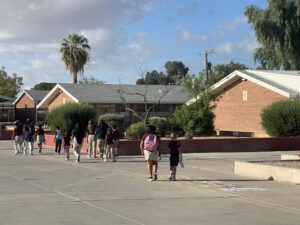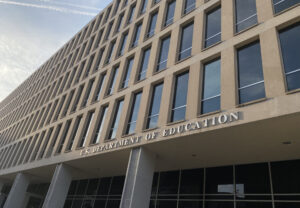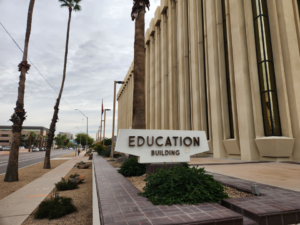EDS: This story has been updated to reflect that the Leona Group, which operates 28 charter schools in Arizona, declined to comment on the record. Please update grafs 14 and 15.
- Slug: Homeless Money Unspent. 950 words.
- Photos available (thumbnails, captions below).
By Madeline Nguyen
Cronkite News
WASHINGTON – The Arizona Department of Education is scrambling to urge schools to tap millions of dollars earmarked to help homeless students before the funds expire at the end of the month.
Three years ago, Arizona schools were allotted nearly $17 million in federal COVID-19 pandemic relief funds intended to provide resources ranging from temporary housing and transportation to prepaid debit cards.
Nearly a quarter of that has gone unused, according to the most recent ADE data.
Numerous school districts contacted by Cronkite News said they were unaware of the aid or learned about it only recently.
State education officials concede that the information wasn’t always communicated to the right personnel and are trying again ahead of the Sept. 30 deadline.
“We’re doing everything we can to make sure the money is spent,” said state Superintendent Tom Horne in an interview. Horne said his agency’s efforts include “nagging” schools by phone to rectify what he called a “breakdown of communication.”
Nationally, nearly $315 million out of $800 million in homeless aid remained unused, according to the most recent data from the U.S. Department of Education’s Office of Elementary and Secondary Education.
Funds to support homeless students were set aside for 98 of more than 200 school districts in Arizona, plus about 50 public charter schools, ADA records show.
Horne said his agency emailed districts about the grants in 2021 and 2022. It’s unclear what follow-up efforts his department made before recent weeks.
“I wasn’t even aware that we had these funds provided to us,” said Jennifer Norred, business manager of Stanfield Elementary School District in Pinal County, which hasn’t used any of the $13,200 it was allotted to support homeless students.
With time running short, homeless-youth advocates like Barbara Duffield are frustrated that available aid hasn’t reached homeless youths “at a time in their life when everything else is turned upside down.”
“It means that they might go hungry,” said Duffield, executive director of SchoolHouse Connection. “It means that they might not show up to school. They may be more at risk of trafficking or abuse or neglect. … This is the way out of homelessness.”
A significant share of the unused funds in Arizona can be traced to The Leona Group, a company that operates 28 charter schools in Arizona and others in Michigan, Ohio and Indiana.
Leona Group schools in Arizona have tapped about $240,000 in grants for homeless students while leaving $567,000 unused, according to ADE data. The Leona Group declined to comment on the record.
Even districts that knew about the money haven’t always used all of their funds, including the two biggest recipients in the state.
Mesa Unified School District has used about 80% of the $920,000 it could have tapped. The Tucson Unified School District has left $140,000 unused out of about $1 million.
‘Breakdown of communication’
The $800 million designated for homeless youths nationwide was part of the massive COVID-19 pandemic relief enacted by Congress in early 2021.
The package was eight times larger than the annual outlay under the main federal education program targeting homeless youths.
Homelessness jumped 30% in Arizona in the three years after the pandemic began in early 2020, topping 14,200 people, according to the U.S. Department of Housing and Urban Development. About one in nine are children.
Homeless students graduate at lower-than-average rates from high school. The grants were meant to address the challenges – including higher rates of absenteeism, substance abuse and attempted suicide.
“If you can stabilize them with housing and support services, if they don’t have to worry about where they’re going to sleep or where their next meal is coming from, they can focus on their education,” said Dawn Bogart, co-CEO of Homeless Youth Connection, which supports high school students in Maricopa and Coconino counties.
Despite the need, districts across Arizona have not used over $3.55 million of these grants, and the ADE itself has yet to tap about $285,000 more, for a statewide total of over $3.8 million.
Running out of time
In a February survey by SchoolHouse Connection, one in four educators nationwide who work with homeless students reported administrative roadblocks had kept them from using some or all of the grants for which they were eligible.
In February, three senators who worked to create the grants — Sens. Kyrsten Sinema of Arizona and Joe Manchin of West Virginia, both independents, and Lisa Murkowski, R-Alaska — pleaded unsuccessfully with the Senate Appropriations Committee for a one-year extension.
The senators argued that the U.S. Department of Education hadn’t clarified the grants’ “flexible uses” until last September — over two and a half years after the funds were appropriated.
Sarka White, ADE deputy associate superintendent, agreed that federal officials left questions unanswered until a year ago, making it harder for the state agency to help local schools.
“If they don’t get their money spent … and it doesn’t get to a student, then we fail as well,” White said. “But also, if we don’t get that same guidance from the federal government, then it’s really hard for a state.”
The U.S. Department of Education rejected blame for local failures to use the funds.
In an emailed statement, a spokesperson said that for three and a half years, the department “has provided extensive technical assistance to states and local educational agencies on how (these) funds can meet the urgent needs of students and families experiencing homelessness.”


